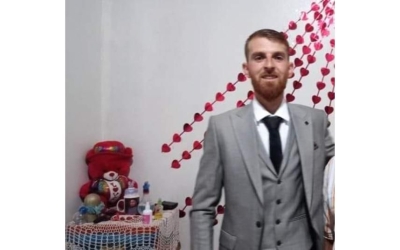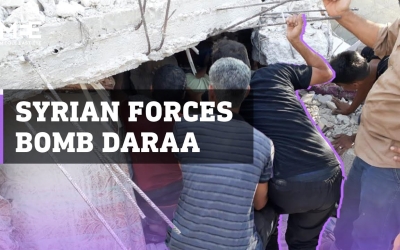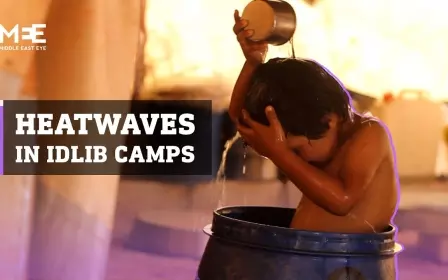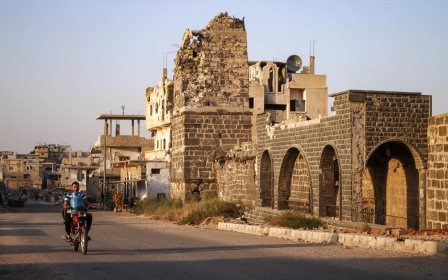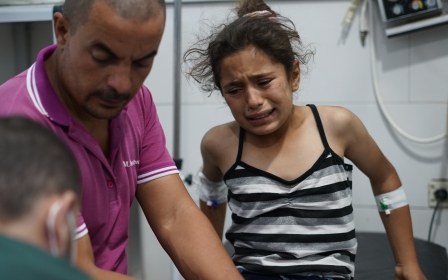Syria: Residents of Daraa al-Balad struggle to survive under siege
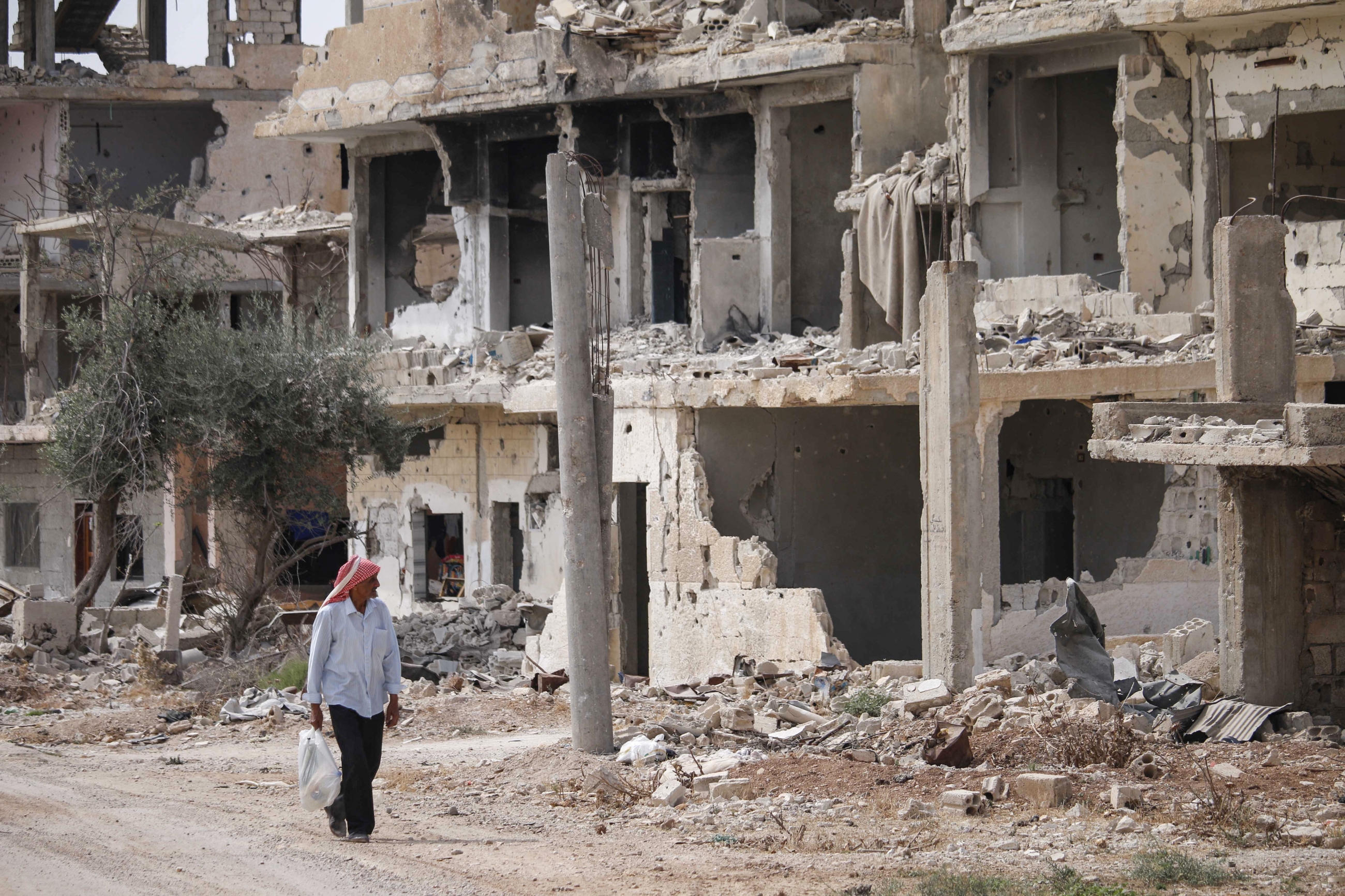
In Suad al-Hariri's home in Syria's Daraa al-Balad district, supplies, food and money are dwindling fast. It's been 48 days since government forces laid siege to the southern district in the provincial capital of Daraa, leaving residents cut off from basic necessities, such as fuel and electricity, and struggling on a daily basis.
As Hariri's husband is no longer able to maintain his job as a taxi driver, the family have lost their source of income and now struggle to pay for food. Meals are now smaller, and less frequent.
Stripped of their freedom of movement, with government forces controlling who goes in and out of the city, thousands of Daraa residents, including Hariri, her husband and two sons, feel trapped in their home town.
"There is no bread… even the food shops are empty, and we won't be able to hold on for long," Hariri, using an alias for security reasons, told Middle East Eye.
In an interview over WhatsApp that was interrupted several times, due to an intermittent connection caused by a weak network, Hariri said that government forces had hit mobile phone and electricity stations.
New MEE newsletter: Jerusalem Dispatch
Sign up to get the latest insights and analysis on Israel-Palestine, alongside Turkey Unpacked and other MEE newsletters
"We have been living without electricity for weeks. Water is barely available, and life in the city is gradually ending," she added.
Prohibition and checkpoints
The family is unable to afford to rent a house outside Daraa, which has increased their sense of being stuck with nowhere to go.
"Nor can we live in the homes of our relatives, each of whom is already living in a difficult situation," Hariri said.
Most of Hariri's neighbours were displaced: today, her neighbourhood is quiet and often plunged into darkness. The silence is broken from time to time by the sound of shelling, or bullets from a government sniper.
"My husband lost his job as a taxi driver," she said. "There is no fuel and he cannot go out in his car to work outside the city. We charge phones at our neighbour’s home, but the fuel he takes from his car tank to run the generator is about to run out."
The main checkpoint, known as the Saraya, prohibits the entry of fuel and foodstuffs. When Hariri managed to get out of Daraa weeks ago, she tried to hide some food and cigarettes, but this only led to her being stopped for hours at the checkpoint.
"I tried to go out again a few days ago to get some bread, but they told me they wouldn't let me back if I did," she said.
The Military Intelligence Directorate, which oversees the management of the Saraya checkpoint, sometimes receives large sums of money in exchange for allowing families to leave or enter.
City exit blocked
Last week, the Military Intelligence Directorate blocked the checkpoint with piles of dirt, to prevent besieged civilians from taking their cars or furniture out of the city.
'We do not want to lose our youth to media drama and empty heroic speeches. We must be realistic'
- Abu Ali al-Muhaimid of the local negotiations committee in Daraa
The opening and closure of the checkpoint depends on the mood of the troops who patrol here - sometimes they open it for a few hours, before closing it for no apparent reason.
The two other checkpoints, the Sijneh, run by the Military Intelligence Directorate, and al-Hal Market, run by the Air Force Intelligence Directorate, are completely closed.
About 10,000 families, or 50,000 people, live in Daraa al-Balad, according to the United Nations Office for the Coordination of Humanitarian Affairs (OCHA). More than 24,000 have been displaced from the district to Daraa city, including Palestinian displaced people, OCHA said in a report released on 3 August.
The Daraa National hospital was hit by four mortar shells, which destroyed a water tank and temporarily rendered the dialysis unit non-functional, OCHA said.
OCHA added that local partners are providing relief rations, supplies, medicines, basic relief items and water to the displaced in the city and surrounding areas. However, the schools and mosques taken over by displaced people as a temporary residence in the cities around Daraa are starting to get overcrowded, prompting some of them to return to Daraa and live under siege.
'We cannot stand alone'
"The situation is very difficult and we cannot withstand the shelling and the siege for more than 10 to 15 days," Abu Ali al-Muhaimid, a member of the local negotiations committee, said in an audio clip heard by MEE.
"We do not want to lose our youth to media drama and empty heroic speeches. We must be realistic; we do not have the ingredients for steadfastness. Our situation is miserable, we do not even have water. We cannot stand alone in the face of modern sophisticated weapons.
"The rest of the cities that enjoy food and water must move to lift the siege of Daraa, before Iranian militias invade the city."
Earlier this month, rebel forces launched sporadic attacks against government forces in Daraa province to ease the siege on civilians: they took control of some military checkpoints and seized various weapons.
The government regained the checkpoints after lengthy negotiations with the local committee. Late last month, following negotiations, the local committee approved the conditions imposed by government forces in order to end the siege and attacks, and spare the city a military offensive. The new agreement requires rebels to give up light weapons that they were allowed to keep under the 2018 agreement.
The committee also agreed to set up three government military and security checkpoints within Daraa, although this raised civilian concerns that the city would become a military barracks and be subjected to retaliatory security operations.
Forces loyal to Iran, deployed alongside the Syrian army, tried to use the agreement to expand their influence in the city, which led to clashes that derailed the new deal just days after it was announced.
Daraa is the city that sparked protests against Syrian President Bashar al-Assad in 2011 and became a major rebel stronghold. Government forces recaptured the city in late 2018 after battles with rebels, which ended with an agreement guaranteed by Russia.
No medical care
Government forces reneged on the terms of that agreement, as they tightened control around Daraa al-Balad to put pressure on opposition fighters to withdraw to rebel-held territory in the north of Syria.
'We have not been able to store bread in coolers due to electricity cuts, so now we eat some dry bread after wetting it with water'
- Saeed al-Zoubi, resident
The 2018 agreement forbade the army from entering many towns and forced rebels to hand over heavy weapons. Thousands of fighters left the province, but many former rebels stayed on, and some joined the army.
Residents now fear a new military offensive, and more uncertainty. Many refused to talk about their humanitarian conditions for fear of risking their safety.
“We will struggle to survive under these conditions after food supplies are gone,” Saeed al-Zoubi, a civilian in his 30s, told MEE. "Anyone who wants to enter or leave has to pay. I cannot bear attempting to get out and re-enter and endure humiliating search methods," said Zoubi, who did not use his real name.
He said the local bakery, which was already only working twice a week, stopped working completely five days ago, after it ran out of flour; while for 15 days, water has been available for only half an hour a day.
“We can barely fill the water tank. We have not been able to store bread in coolers due to electricity cuts, so we now eat some dry bread after wetting it with water,” Zoubi added. “Most hospitals, pharmacies, have closed. We are afraid of getting sick or injured as a result of an attack. There is no medical care in the city."
Middle East Eye delivers independent and unrivalled coverage and analysis of the Middle East, North Africa and beyond. To learn more about republishing this content and the associated fees, please fill out this form. More about MEE can be found here.


